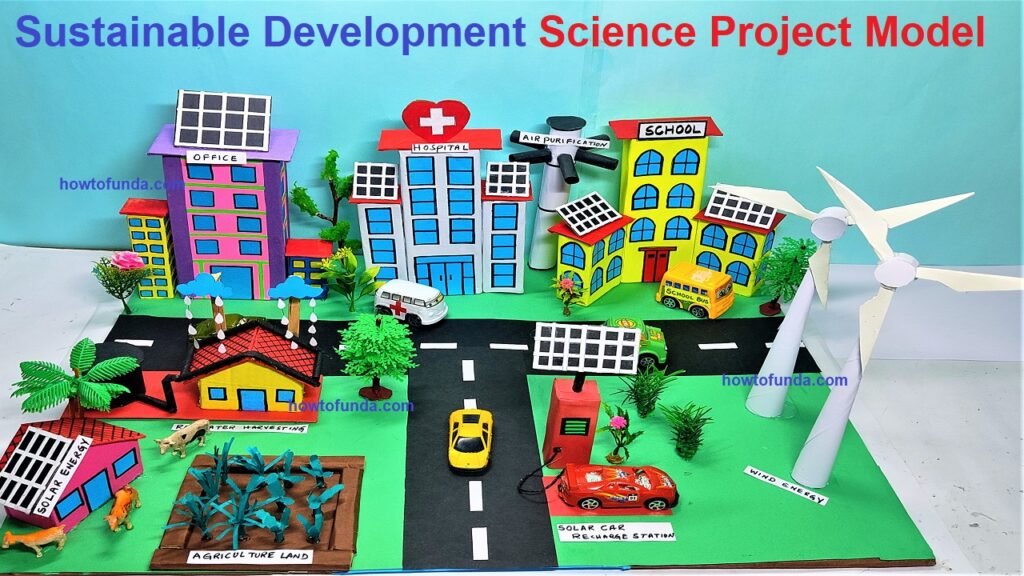Here are some sustainability-focused science project ideas suitable for school projects.

These ideas span various topics, including energy conservation, waste reduction, water management, and sustainable agriculture:
1. Solar Oven
- Objective: Build and test a solar oven using simple materials.
- Description: Design and construct a solar oven using cardboard, aluminum foil, and plastic wrap. Test its ability to cook food using solar energy.
2. Recycling Paper
- Objective: Create recycled paper from used paper products.
- Description: Collect used paper, process it into pulp, and create new sheets of recycled paper. Compare the quality and usability of the recycled paper to new paper.
3. Water Filtration System
- Objective: Design a water filtration system using natural materials.
- Description: Construct a water filter using sand, gravel, and charcoal. Test its effectiveness in removing contaminants from water.
4. DIY Wind Turbine
- Objective: Build a small-scale wind turbine and measure its energy output.
- Description: Construct a wind turbine using materials like PVC pipes and a small generator. Test its ability to generate electricity under different wind conditions.
5. Composting at School
- Objective: Implement a composting program at school and measure its impact on waste reduction.
- Description: Set up compost bins, educate students about composting, and track the amount of organic waste diverted from the trash.
6. Energy-Efficient Lighting
- Objective: Compare the energy consumption of different types of light bulbs.
- Description: Measure and compare the energy usage and brightness of incandescent, CFL, and LED bulbs. Calculate potential energy savings by switching to more efficient lighting.
7. Rainwater Harvesting
- Objective: Design and test a rainwater harvesting system.
- Description: Create a system to collect and store rainwater from the school roof. Measure the amount of water collected and potential uses for irrigation or cleaning.
8. Hydroponic Garden
- Objective: Grow plants using a hydroponic system and compare growth rates to soil-based plants.
- Description: Set up a hydroponic garden and monitor the growth of various plants. Compare their growth and health to those grown in traditional soil.
9. Plastic Waste Reduction
- Objective: Develop strategies to reduce plastic waste at school.
- Description: Implement a plastic reduction campaign, such as promoting reusable water bottles and containers, and measure the decrease in plastic waste.
10. Green Roof Model
- Objective: Create a model of a green roof and measure its benefits.
- Description: Build a small-scale green roof and analyze its effects on temperature regulation, water runoff, and air quality.
11. Sustainable Transportation Survey
- Objective: Investigate the transportation habits of students and propose sustainable alternatives.
- Description: Conduct a survey to understand how students travel to school. Propose and promote sustainable transportation options like biking, walking, or carpooling.
12. Biodegradable Plastic Alternatives
- Objective: Test the effectiveness of biodegradable plastics compared to conventional plastics.
- Description: Create or source biodegradable plastic products and compare their degradation rates and environmental impact to traditional plastics.
13. Urban Heat Island Effect
- Objective: Study the impact of vegetation on urban heat islands.
- Description: Measure temperature differences in areas with and without vegetation in your school or neighborhood. Propose planting more trees and green spaces to mitigate heat.
14. Solar-Powered Model Car
- Objective: Build a small solar-powered car and test its performance.
- Description: Construct a model car powered by solar panels and measure its speed and distance traveled under different light conditions.
15. Waste Audit
- Objective: Conduct a waste audit at your school to identify waste sources and propose reduction strategies.
- Description: Collect and categorize waste produced in different areas of the school. Analyze the data and suggest ways to reduce waste and improve recycling.
16. Vertical Gardening
- Objective: Design and build a vertical garden to maximize space usage.
- Description: Create a vertical garden using recycled materials and grow various plants. Measure the space efficiency and growth rate compared to traditional gardening.
17. Carbon Footprint Calculator
- Objective: Develop a tool to calculate the carbon footprint of common activities.
- Description: Create a calculator to estimate the carbon emissions from activities like transportation, electricity use, and food consumption. Propose ways to reduce these emissions.
18. Eco-Friendly Cleaning Products
- Objective: Test the effectiveness of homemade eco-friendly cleaning products.
- Description: Make cleaning products using natural ingredients like vinegar, baking soda, and lemon juice. Compare their cleaning power and environmental impact to commercial products.
19. Sustainable Packaging
- Objective: Design and test sustainable packaging alternatives.
- Description: Create packaging from materials like recycled paper, cornstarch, or mushroom mycelium. Evaluate their durability, cost, and environmental impact compared to traditional packaging.
20. Energy Audit
- Objective: Conduct an energy audit of your school to identify areas for improvement.
- Description: Measure energy consumption in different parts of the school and identify opportunities to reduce usage, such as improving insulation, upgrading lighting, or using programmable thermostats.
These projects provide a range of opportunities for students to engage with sustainability concepts and develop practical solutions to environmental challenges.

